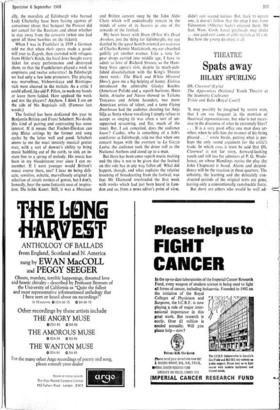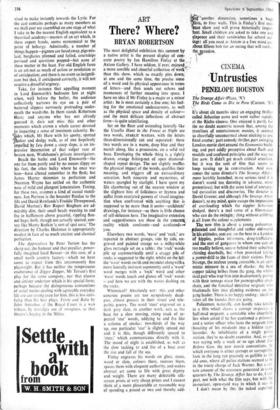Oh, Clarence! (Lyric)
THEATRE
Spats away
HILARY SPURLING
The Apprentices (National Youth Theatre at the Jeannetta Cochrane) Trixie and Baba (Royal Court)
'It may possibly be imagined by severe men, that I am too frequent in the mention of theatrical representations; but who is not exces- sive in the discourse of what he extremely likes? . . . It is a very good office one man does an- other, when he tells him the manner of his being pleased . . .' wrote Steele, putting what is per- haps the only sound argument for the critic's trade. In which case, it must be said that Oh, Clarence! is not for stern, forward-looking youth and still less for admirers of P. G. Wade- house, on whose Blandings stories the play (by John Chapman) is based. Alarm and despon- dency will be the reaction in these quarters. The urbanity, the learning and the delicately con- structed periods of the original texts are gone, leaving only a conventionally ramshackle farce.
But there are others who would be well ad- vised to make instantly towards the Lyric. For the cast contains perhaps as many members as we shall over see assembled on one stage of what I take to be the nearest English equivalent to a theatrical academy—masters of an art which, in these expert hands, seems economical to the point of lethargy. Admittedly, a number of things happen—pigmen are lured away, pigs mis- laid, burglaries planned and foiled, courtships pursued and questions popped—but none of these matter in the least. For- old English farce is an art not so much of action or revelation as of anticipation; and there is no event so insignifi- cant but that, if anticipated correctly, it will not acquire a dreadful urgency.
Take, for instance that appalling moment in Lord Emsworth's bedroom late at night when, well before the butler, the audience collectively narrows its eye on a pair of battered slippers nervously protruding under- neath the wardrobe. In them stands Robertson Hare; and anyone who has not already guessed it, dare not miss this and other moments which crown a whole career devoted
ioimparting a sense of imminent calamity. Be- des which, Mr Hare with his sporty, spotted oker and dodgy walk, as of one hopelessly 6 tropelled by fate down a steep slope, is an im-
pressive incarnation of that vulgar race of beaten men, Wodehouse's private investigators.
Beach the butler and Lord Emsworth—the one far from portly and by no means slippy on his feet, the other bulky where he once was lean—have altered somewhat in the flesh; but James Hayter shimmies to perfection and Naunton Wayne has settled on the authentic note of mild and plangent lamentation. Timing, for these two, assumes a kind of casual stateli- ness. Jon Pertwee is the bounder Parsloe to the life and David Rowlands's Freddie Threepwood, David Morton's Rev Rupert Bingham are ad- mirably dim, their small heads weaving to and fro in bafflement above graceful, rippling flan- nel bags; both, though not actually spatted, con- vey like Monty Bodkin 'a sort of spat aura.' The direction by Charles Hickman is appropriately modest in face of so much ancient and classical perfection.
The Apprentices by Peter Terson has the sharp ear, the humour and that peculiar, power- fully imagined local flavour—in this case, of a small north country factory—which we have come to expect from this uncommonly fine playwright. But it has neither the tempestuous exuberance of Zigger Zagger, Mr Terson's first play for the same company, nor that elusive and sinister undertow which is his special forte; perhaps because the disingenuous conventions of serial stories dealing with agreeable everyday life are coo strong even for him, this is less satis- fying than his best plays. Trixie and Baba by John Antrobus at the Royal Court is a wan tribute, by nostalgia out of smugness, to that theatre's heyday in the 'fifties.







































 Previous page
Previous page